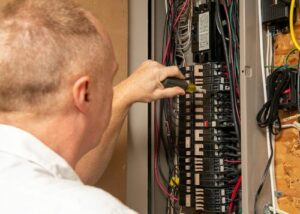Circuit breakers are essential components of your home’s electrical system. They protect your home by cutting off the electrical supply when a fault is detected, preventing potential fires and other hazards. But how can you tell if your circuit breaker is bad? Here are some key signs to look for and what you should do about them.
Signs of a Bad Circuit Breaker
- Frequent Tripping: If your circuit breaker trips often, it’s a clear sign that something might be wrong. While occasional tripping can be due to an overloaded circuit or short-circuiting, frequent tripping suggests a deeper issue with the breaker itself.
- Breaker Won’t Reset: Sometimes, a circuit breaker won’t reset after it trips. If you’ve tried resetting it and it immediately trips again, or if it doesn’t stay in reset mode, this could indicate a bad circuit breaker.
- Burning Smell: A burning smell coming from your electrical panel is a serious warning sign. It could indicate that the breaker is overheating or that there is an electrical fire hazard. If you notice a burning smell, turn off the power and contact a professional electrician immediately.
- Physical Damage: Inspect your circuit breakers for any visible damage, such as burns, cracks, or corrosion. Physical damage can impair the breaker’s ability to function correctly and should be addressed promptly.
- Breaker Feels Hot: While it’s normal for breakers to generate some heat, they should not feel hot to the touch. An overheating breaker is a sign that it may be failing and could pose a fire risk.
- Flickering Lights: If the lights in your home flicker when you turn on certain appliances, it could be a sign of a bad breaker. This can happen if the breaker is not providing a steady supply of electricity.
How to Test Your Circuit Breaker
If you suspect that your circuit breaker is bad, you can perform a simple test to confirm it. However, working with electricity can be dangerous, so it’s always best to call a professional electrician for an accurate diagnosis and safe handling.
- Turn Off All Appliances: Before testing the breaker, turn off and unplug all appliances and lights on the affected circuit. This will prevent any potential damage to your devices.
- Reset the Breaker: Try resetting the breaker by flipping it to the “off” position and then back to the “on” position. If it trips immediately, there might be an issue with the breaker.
- Check for Continuity: Using a multimeter, you can check the continuity of the breaker. Set the multimeter to the continuity setting and place the probes on the breaker terminals. A continuous beep indicates that the breaker is functioning correctly, while no beep suggests a faulty breaker.
- Inspect the Electrical Panel: Look for any signs of damage or wear in the electrical panel. Burn marks, corrosion, or loose wires can indicate problems that may affect the breaker’s performance.
When to Call a Professional Electrician
If you notice any of the signs mentioned above or if your breaker fails the continuity test, it’s time to call a professional electrician. Here’s why:
- Safety First: Working with electricity is hazardous, and a qualified electrician has the training to handle it safely.
- Accurate Diagnosis: Electricians can accurately diagnose the problem and determine whether the breaker needs to be repaired or replaced.
- Code Compliance: Electricians ensure that all work complies with local electrical codes and regulations.
- Efficient Repairs: Hiring a professional saves you time and hassle, as they can quickly and efficiently address the issue.
Preventive Maintenance Tips
Regular maintenance can help prevent circuit breaker issues and extend their lifespan. Here are some tips:
- Regular Inspections: Have your electrical panel and breakers inspected by a professional electrician regularly.
- Keep the Panel Clean: Dust and debris can affect breaker performance, so keep the panel clean and free of obstructions.
- Monitor Electrical Loads: Avoid overloading circuits by spreading out high-energy appliances across different breakers.
- Replace Old Breakers: Consider replacing old breakers before they fail to maintain the safety and reliability of your electrical system.
Final Thoughts
Knowing how to tell if your circuit breaker is bad can help you address potential issues before they become serious problems. If you notice frequent tripping, inability to reset, burning smells, physical damage, or overheating, it’s time to take action. By calling a professional electrician, you can ensure that your home’s electrical system remains safe and reliable.
If you suspect a bad circuit breaker, don’t hesitate to give us a call. Our team of expert electricians is here to help you diagnose the problem and provide the best solution for your home’s electrical health. Stay safe and keep your home’s electricity running smoothly with our trusted services.
FAQs – Circuit Breakers
How do I know if my circuit breaker is bad?
You can tell if your circuit breaker is bad by looking for signs such as frequent tripping, inability to reset, burning smells, visible damage, and overheating. If your lights flicker or the breaker feels hot to the touch, these are also indicators of a bad breaker.
What causes a circuit breaker to go bad?
Circuit breakers can go bad due to various reasons, including wear and tear over time, exposure to excessive loads, short-circuiting, physical damage, and manufacturing defects. Regular maintenance can help prevent some of these issues.
Can a bad circuit breaker cause a fire?
Yes, a bad circuit breaker can potentially cause a fire if it fails to trip during an overload or short circuit, allowing excessive current to flow through the electrical system. Signs like a burning smell or the breaker being hot to the touch should be addressed immediately to prevent fire hazards.
How often should circuit breakers be replaced?
Circuit breakers typically last 15 to 20 years, but this can vary based on usage and environmental factors. It’s a good idea to have them inspected regularly by a professional electrician and replaced if they show signs of damage or wear.
Can I replace a circuit breaker myself?
While it is possible to replace a circuit breaker yourself, it is not recommended due to the risks involved with working with electricity. It is safer and more effective to hire a qualified electrician to handle the replacement.
What should I do if my circuit breaker won’t reset?
If your circuit breaker won’t reset, first try turning it off and then back on. If it still doesn’t stay in reset mode, there might be a serious issue with the breaker or the electrical system. It’s best to call a professional electrician to diagnose and fix the problem.
Why is my circuit breaker hot to the touch?
A circuit breaker that is hot to the touch indicates it may be overloaded or failing. This can pose a fire risk, so turn off the power and contact a professional electrician to inspect and address the issue.
When should I call for emergency service?
You should call for emergency service if you notice signs of a bad circuit breaker such as a burning smell, visible damage, or if the breaker won’t reset and you experience frequent power outages. Immediate attention from a professional electrician can prevent potential hazards.
